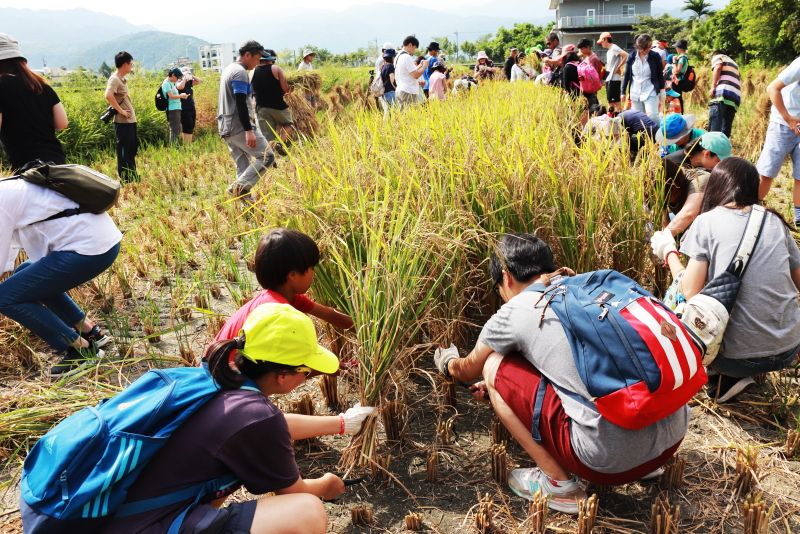
A Taiwanese farm village experiment to reconnect people with the land
Originally written in Chinese by Yaju Chin and translated/edited by Chin-Wu Chen.
Originally written in Chinese by Yaju Chin and translated/edited by Chin-Wu Chen.
Outline
In a small, 0.24-acre paddy field, there are several adults and kids, heads down, sleeves rolled up, bowing toward the field, dedicatedly focusing on transplanting rice seedlings. For them, the opportunity to work in the field is a dream come true. They have Ching-Sung Lai to thank, who helps make the dream a reality: the first community-supported agriculture experiment in Taiwan.
The first community-supported agriculture experiment in Taiwan
This is Shengou Village in Yuanshan Township of Yilan County in northeastern Taiwan, a fertile delta plain opening to the Pacific Ocean. In 2004, Mr. Lai, transitioning from a career in supply chain management to full-time farming, founded the Ko-Tong (a Taiwanese word meaning ‘crop shareholders’) Rice Club. It is a concept adopted from the corporate world, but instead of investing in a publicly traded company, the crop shareholders invest the cost of farming for a season, and the return is the harvest: rice. The investment amount depends on how much rice one would like to receive. In this way, the club members share the cost as well as the risk. Mr. Lai acted as the manager of the club and was responsible for all farming activities. He conceived this co-op-style farming and distribution model to alleviate the burden for those who wanted to try it and create a community that supports eco-friendly farming practices.
Such a novel approach to this age-old human activity attracted public interest beyond Lai’s expectations. Investors came on board from around the island, enabling the club to hit the ground running smoothly. To get the investors involved and to have them experience the farming activities firsthand, Lai developed a series of events throughout the year based on the season, inviting investors to participate in the work on the farm. In the springtime, for example, there was the ‘Transplanting Party’ where members became one-day farmers; in the summer it was harvest gathering and in the winter solstice, rice ball making, and a celebration of abundance.
Both feet in the soil
I became a Ko-Tong myself at the end of 2011, investing for the potential harvest of 2012. I don't remember how I came across the club, perhaps it was during some of the interviews I conducted as a tourism journalist around the island. Born and raised in metropolitan Taipei, I am a downright city-dweller, lacking such memories some of my classmates in school had that I have always been envious of: visiting relatives in the countryside during holidays and rushing to secure train tickets back to a hometown somewhere outside of Taipei during the Lunar New Year. Over the years, there is a seed patiently waiting to bud, a seed of thought that I yearn for to connect more with the land.
It was a chilly day at the end of March when I stepped into a paddy field for the very first time, with long sleeves on top and pants rolled up. “Wouldn’t it be too cold barefoot in the field?” I wondered, only to be surprised by the warmth of the soil I felt embracing my feet and legs. At that moment, I realized that the earth has always been nurturing life in such a gentle way.
Mr. Lai helped me and other helpers ‘draw’ grids in the paddy, using a traditional tool, ‘lun ko ah’, with wheels that would leave traces when manually pulled through the field. He then instructed us to transplant seedlings at crossing points of the grids. Carrying a plate of seedlings, everyone walked carefully into the field, discovering that it was not at all easy to walk through the muddy and wet soil. At first, everyone was being extra cautious to avoid getting dirt on their clothes, but that was inevitable. We gave up quickly, as the submerged field was uneven below a layer of water, the depth of which we couldn’t really estimate before we stepped into it. Sometimes the grids were vague. I was trying to transplant each seedling at the precise spot; but before long, I just decided to go with the flow. The result was a curvy line dotted with seedlings. Mr. Lai had to walk around and help us make things straight. We felt like we were probably helping, but were worried about messing it up. Mr. Lai comforted us by saying that as long as each seedling has enough surrounding space, it would thrive eventually. It would even straighten itself after becoming bent. This is the force of nature.
Reconnecting people with land
I also participated in the harvest in late summer, when I learned firsthand how skillful it is to effectively and efficiently wield a sickle without exhausting oneself. I was in awe to see professional farmers make it seem effortless. We bundled up the remaining straw to be piled up as embankments. After being sun-dried, the straw would be spread on the field to prevent weeds from growing and to retain moisture in the soil. It is wisdom passed down from generations of local farmers.
In fact, most farming practices nowadays have been mechanized and industrialized. Farmers sweating and bending in the field under the sun is a scene described in books but not in real life anymore. However, Mr. Lai made the effort to keep a few patches of fields for urban dwellers like me to get a chance to experience the old way of farming. “There is no way local farmers would let you guys mess around like this,” Mr. Lai laughed, but his mission is to reconnect people with the land, not the efficiency and disconnect of an industrialized world.
Mr. Lai wrote and sent newsletters to shareholders regularly over the year to keep everyone posted on the happenings on the farm. They always reminded me of the change of seasons, easily overlooked in city life. April is time for transplanting, August for harvest. Time permitting, I would return to Shengou as a make-believe farmer once or twice a year. Mr. Lai himself has been keeping a detailed journal documenting his work and thoughts about farming. In 2013 he wrote, “…It has been ten years since I became a farmer, so fulfilling yet so dreamy. Every step in the field, and every interaction with people, either smooth or adverse, has been satisfying. Ending a wandering period in life and turning a strange land into [a] hometown is like a dream. The starting point is a vision of enabling city dwellers to enjoy the harvest of their own labor. Now, helping those who desire to find a way back to a life they truly love is our common goal for the future.” Ushering in the second decade of the club, Mr. Lai’s original dream has been ever-thriving and ever-expanding. A novel farming village is gradually taking shape.
(This article was originally written in Chinese by Yaju Chin, translated/edited for Terra.do by Chin-Wu Chen, and published here.)
--------
Yaju Chin, from Taipei, Taiwan, is a tourism journalist-turned-freelance writer with 20 years of news media experience. Her footsteps have covered every corner of Taiwan, and her encounters with people who are dedicated to land always move and stimulate her to tell their stories through her writing. Yaju writes about sustainable development, regional revitalization, and the innovation of the travel and tourism industry. Her writings have appeared in various magazines and news outlets, as well as on the online platform Vocus (https://vocus.cc/user/@cacao).
Chin-Wu Chen is a Terra.do Learning For Action and Climate Farm School alum. He is from Taipei and is currently based in California.
More like this
So You're Ready to Step Up on Climate Action. Now What?
Folks ready to learn and do more about climate change have an array of options to get started. What are their respective pros and cons, and how does Terra.do stack up?
Our Next Cohort's Nickname Is the Manatees. Here's Why That's Special.
We've named each graduating class after animals at risk in our warming world, and we've just finished our first full lap through the alphabet.
Couldn’t We All Use More Storage?
Where are we going to put all that clean power from variable renewables like solar and wind? The world of batteries is already ramping up.

 Background
Background



